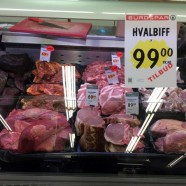SPAR Norway Under Fire
SPAR NORWAY UNDER FIRE FOR ITS KEY ROLE IN PROPPING UP NORWEGIAN WHALING
SPAR Norway – a part of the international SPAR convenience store chain – is a major enabler and supporter of Norway’s struggling whaling industry.
Meat products from the hunts of protected minke whales killed in Norwegian waters are sold in SPAR Norway stores as well as in other retail outlets also owned by parent company NorgesGruppen.
There are currently 276 SPAR and EuroSPAR stores in Norway and investigations this summer found a variety of whale products on sale.
Japan Strikes Back
Information note n°4
Whales at the International Court of Justice
The Hague, The Netherlands, 1st hearing of Japan, July 2nd – July 3rd
Japan, a country surrounded by sea, states that they “would be the last to misuse whales as resources because [they] know [they] benefit from the fruits of the sea”. Japan goes back in time explaining that they joined the International Whaling Commission (IWC) in 1951 “at a time when, amidst the devastation of war, whale meat helped prevent starvation” for a country with scarce land resources. They go even further back in time and point at the irony of history as it was whaling that forced them to interact with the international community after three hundred years of isolation. Japan stated that in the 19th century, “major maritime powers engaged in massive scale whaling demanded that Japan open up its ports to supply their whalers”. And it is this very subject, whaling, which today puts in question Japan’s compliance with the international community and international law and has brought them, for the first time, before the International Court of Justice.
Japan Strikes Back
Information note N°4
Whales at the International Court of Justice
The Hague, The Netherlands, 1st hearing of Japan, July 2nd – July 3rd
Japan, a country surrounded by sea, states that they “would be the last to misuse whales as resources because [they] know [they] benefit from the fruits of the sea”. Japan goes back in time explaining that they joined the International Whaling Commission (IWC) in 1951 “at a time when, amidst the devastation of war, whale meat helped prevent starvation” for a country with scarce land resources. They go even further back in time and point at the irony of history as it was whaling that forced them to interact with the international community after three hundred years of isolation. Japan stated that in the 19th century, “major maritime powers engaged in massive scale whaling demanded that Japan open up its ports to supply their whalers”. And it is this very subject, whaling, which today puts in question Japan’s compliance with the international community and international law and has brought them, for the first time, before the International Court of Justice.









